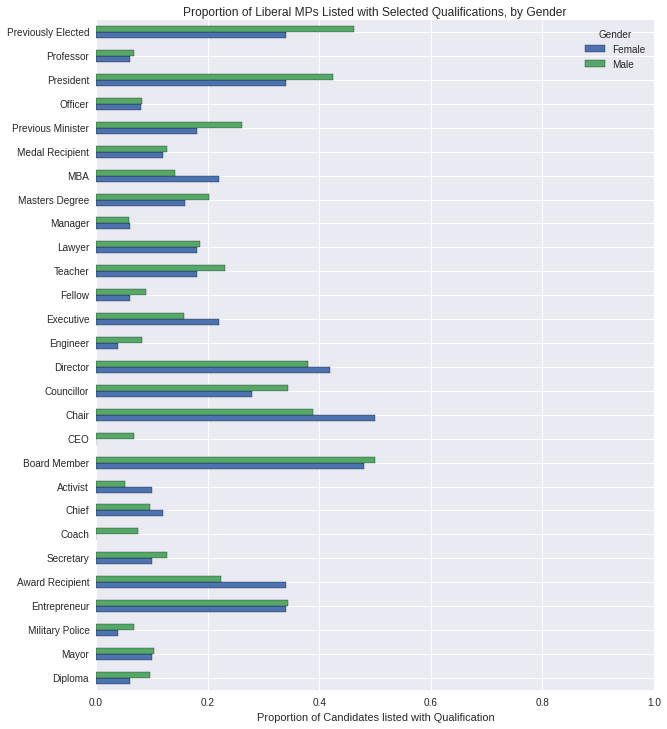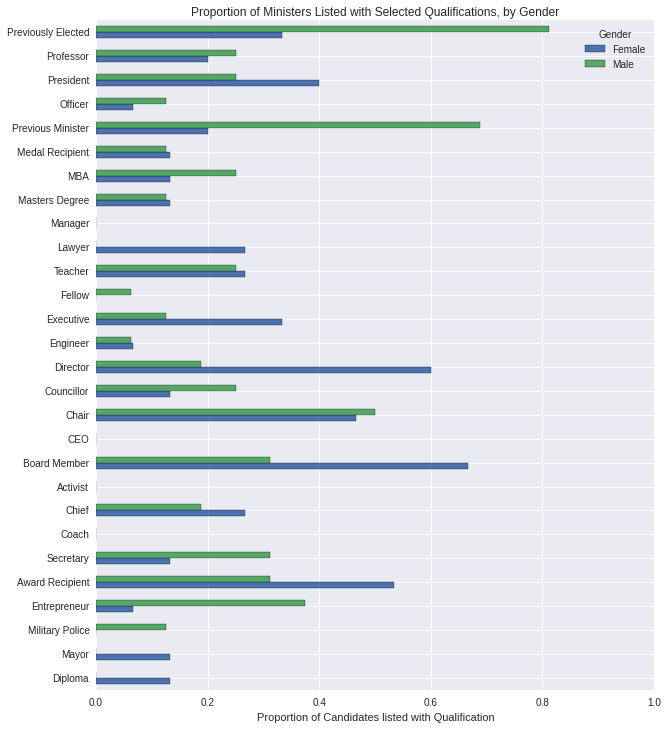There's been a lot of discussion recently about the place of merit in Canada's executive branch. As a quick recap, the country's Cabinet, made up of elected MPs chosen by the Prime Minister, are the main part of government that oversees the government's operation, proposes laws, and generally calls the shots. The new Liberal government has found a first in producing the first cabinet in Canada's history which has just as many female ministers as male ones (the Prime Minister also counts as a minister, so there's technically one more male minister.) That makes 15 female ministers and 15 male ministers chosen from 50 female and 133 male non-Prime Minister MPs.
From my side of the computer screen, a substantial part of this discussion has been people getting various shades of upset about the seemingly arbitrary decision to have a gender-equal cabinet. One of the more valid arguments made are that there are less female MPs than male MPs, so if we're being fair we would expect to see more male cabinet ministers than female ones. The idea that has come up again and again is that the makeup of the cabinet should be decided on merit, not on politics.
Now, I'm inclined to agree with this sentiment. I like the idea of having competent people being the ones running the government. But I want to make it clear that there are important considerations aside from having competent MPs. One of these important things is ability for ministers to act as role models. Too often, we find relatively few role models for disadvantaged people, because of the disctinction society makes based on the colour of their skin, the community they are from, or the sex of their birth. A strong set of senior elected officials in the government could serve as amazing role models for the marginalized. That is why the announcement of Aboriginal ministers was such a great moment, and why the announcement of a gender-equal cabinet should be as well.
I'm not going to talk about that. As I said, I like the idea of having competent people in government, and I was interested in the impact of this non-merit based forcing (however good it may be overall) would have on the qualifications of those who make up the cabinet.
To test this question, I went to the Liberal party's website (here), which has a handy list of MPs with their bios. If you look into the structure of the page, the HTML also includes a bit of extra information on each MP.
At this point, the caveats have to come out. By using the bios supplied by the Liberal Party's website, I'm not getting a perfect list of qualifications for each MP. As such, biases introduced from the writers of the bios may find their way into the analysis. The powers at be designing the party's website may have decided it would be better marketing to describe male and female MPs differently. However, I figured that it was a safe bet for the party to advertise its leadership based on the qualifications of its candidates firstmost, and so you'd expect that at least on average, MPs will have their most impressive qualifications included in the bios.
Knowing the structure, it was a simple matter of scraping out the counts of references to qualifications in each MP's bio and HTML. The coders of the Liberal party's page seem like they were competent, so it was a breeze. With the data, all it took was to divide the MPs by gender and get the proportion of MPs with each qualification. Putting the result in a nice bar chart gets this breakdown:

There's definitely some irregularity in the data. But I found it remarkable how similar the qualifications of male and female MPs seemed to be. A higher proportion of male MPs have a background as presidents of organizations than women MPs, but female MPs are more likely to have backgrounds as chairs of organizations than their male counterparts. Whatever distortions voters had introduced into the selection of MPs with regards to candidates' genders, the result was a pretty evenly qualified group of Liberal MPs.
Now, what happens when we only look at those MPs who were selected as ministers?

From the (admittedly small) population of ministers, we get a very different picture. None of the male ministers were described as lawyers, while 4 women were lawyers. 3 men were described as being directors, 5 as board members, and 2 as executives, while the numbers for women are 9 directors, 10 board members, and 5 executives. Men do outnumber women in some areas, notably with descriptions of "business" and as entrepreneurs. But male ministers substantially outnumber women ones in the sole qualification of having previously been elected, and of having previously been ministers.
The fact that political experience is the main place where male ministers seem to be "outqualifying" female ministers raises some interesting questions. And the fact that women outqualify men in so many areas is equally surprising. The pool of women MPs is less than half the size of male MPs, and cabinet ministers make up a whopping 30% of all the Liberals' women in parliament. If selection was strictly based on qualifications, you'd expect the average female minister to be less qualified than her male counterpart, considering the pool of MPs they are drawn from have a similar distribution of qualifications but unequal sizes. Instead, you get the opposite of what you'd expect, with female ministers broadly appearing to be more qualified when it comes to matters outside of politics. This suggests that there may have been a different process for selecting female MPs to be cabinet ministers than male ones.
I can't decide what the driver for this process was, but it is something worth discussing. Most importantly, there's some evidence that the push for a gender-equal cabinet hasn't endangered the qualifications of cabinet ministers. In fact, it seems like the push for gender equality has actually introduced ministers who are more qualified in matters outside of politics. Definitely not something to make a fuss about.
All of my analysis was done in Python. This article was inspired both by the topic itself, and the fact that I was itching to find a project to practice my pandas-fu with. I will be putting my analysis up on github, and may end up writing another post on pandas in the future.
If you like this analysis but want it to be a little more robust, you could always research each MP individually and compose a list of their qualifications. I may supplement the Liberals' provided bios with information from Wikipedia and update this post or write a follow up. If you're interested in helping, have your people call my people.